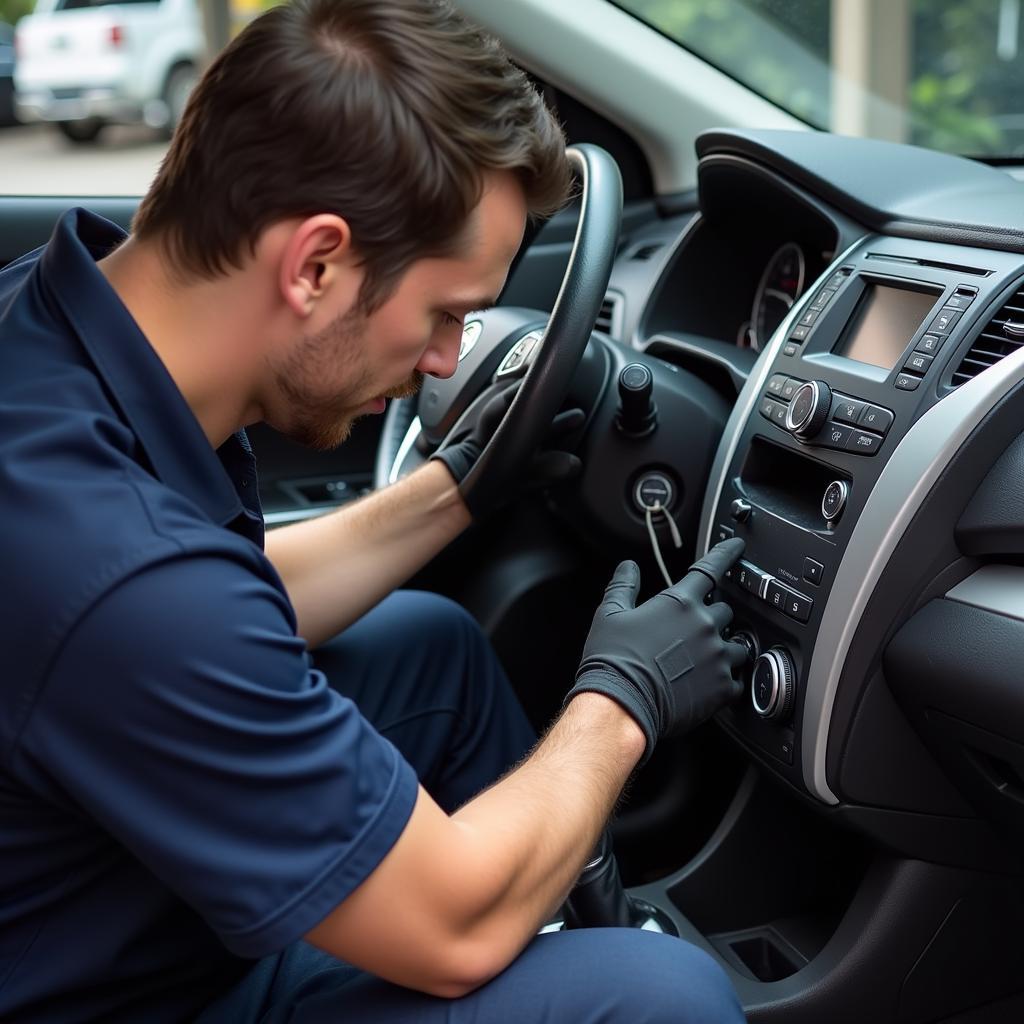Car Air Conditioner Diagnostics are crucial for ensuring a comfortable and enjoyable driving experience, especially during the hot summer months. When your AC system isn’t working correctly, it can lead to uncomfortable drives and potential damage to the system.
Understanding the basics of car air conditioner diagnostics can help you identify problems early on and prevent costly repairs. This guide will provide you with comprehensive information about car AC diagnostics, common issues, and their solutions.
Understanding Your Car AC System
Before diving into diagnostics, it’s essential to understand the basic components of your car’s AC system:
- Compressor: This is the heart of the system, responsible for compressing and circulating the refrigerant.
- Condenser: Located at the front of the vehicle, the condenser cools the refrigerant, converting it from a high-pressure gas to a high-pressure liquid.
- Evaporator: Positioned inside the dashboard, the evaporator absorbs heat from the cabin air as the refrigerant evaporates, cooling the air blown into the car.
- Receiver/Drier: This component stores refrigerant, removes moisture from the system, and filters out debris.
- Expansion Valve/Orifice Tube: This regulates the flow of refrigerant into the evaporator.
Common Car Air Conditioner Problems
Several issues can arise with your car’s AC system. Here are some of the most common:
- Refrigerant Leak: A low refrigerant level is one of the most frequent causes of AC problems. Leaks can occur in the hoses, connections, or components.
- Electrical Issues: Problems with the AC compressor clutch, blower motor, or electrical wiring can also lead to AC failure.
- Faulty Compressor: The compressor can fail due to wear and tear, lack of lubrication, or electrical problems.
- Blocked Condenser: Debris, dirt, and bugs can accumulate on the condenser, restricting airflow and reducing cooling efficiency.
- Broken Cooling Fans: Malfunctioning cooling fans can prevent the condenser from properly cooling the refrigerant.
Car Air Conditioner Diagnostics
Diagnosing car air conditioner problems involves several steps:
- Visual Inspection: A technician will visually inspect the AC components for any signs of damage, leaks, or blockages.
- System Pressure Check: Using pressure gauges, a technician will check the high and low-side pressures of the AC system to determine if the refrigerant levels are correct.
- Leak Detection: If a leak is suspected, the technician will use a leak detector to pinpoint the source.
- Electrical System Check: The technician will check the electrical components, such as the compressor clutch, blower motor, fuses, and wiring, for any issues.
- Performance Test: The technician will run the AC system to assess its cooling capacity and overall performance.
DIY vs. Professional Car Air Conditioner Diagnostics
While some basic checks, like inspecting the drive belt and feeling for cold air, can be done at home, it’s highly recommended to consult a qualified mechanic for comprehensive car air conditioner diagnostics and repairs.
Professional technicians have the expertise, equipment, and experience to accurately diagnose and repair complex AC issues, ensuring your safety and the longevity of your AC system.
Importance of Regular Car Air Conditioner Maintenance
 Regular Car Air Conditioner Maintenance
Regular Car Air Conditioner Maintenance
Regular car air conditioner maintenance can help prevent costly repairs and extend the lifespan of your AC system. Here are some essential maintenance tasks:
- Regular Inspections: Have your AC system inspected annually or as recommended by your vehicle manufacturer.
- Refrigerant Recharge: Recharge your AC system every 2-3 years or as needed.
- Cabin Air Filter Replacement: Replace your cabin air filter every 12,000 miles or annually to ensure optimal air quality and airflow.
- Condenser Cleaning: Regularly clean the condenser to remove debris and ensure proper airflow.
When to Seek Professional Help
If you experience any of the following, it’s crucial to consult a professional mechanic:
- Weak or no cold air blowing from the vents
- Unusual noises from the AC system
- Foul odors emanating from the vents
- AC system cycling on and off frequently
Conclusion
Car air conditioner diagnostics are essential for maintaining a comfortable driving experience and preventing costly repairs. Regular maintenance, early detection of problems, and prompt repairs by qualified professionals can significantly extend the life of your AC system and keep you cool and comfortable on the road, no matter the weather.
FAQs about Car Air Conditioner Diagnostics
1. How often should I have my car’s AC system serviced?
It’s generally recommended to have your car’s AC system serviced annually or every 12,000 miles, whichever comes first.
2. How much does it cost to diagnose a car AC problem?
The cost of car AC diagnostics can vary depending on the complexity of the issue and the mechanic’s labor rates. On average, you can expect to pay between [average cost of car diagnostic check].
3. Can I add refrigerant to my car’s AC system myself?
While DIY refrigerant recharge kits are available, it’s not recommended unless you have the proper knowledge and equipment.
4. How long does it take to diagnose a car AC problem?
Diagnosing a car AC problem can take anywhere from 30 minutes to a few hours, depending on the complexity of the issue.
5. What are some signs of a refrigerant leak in my car’s AC system?
Some signs of a refrigerant leak include a hissing sound when the AC is on, oily residue near the AC components, and a gradual decrease in cooling performance.
Need More Help?
For further assistance with your car air conditioner diagnostics and repairs, please contact our team of experts via WhatsApp: +1(641)206-8880 or email us at [email protected]. We’re available 24/7 to answer your questions and provide you with the support you need. You can also find more information in our article on average cost of car diagnostic check.

Leave a Reply